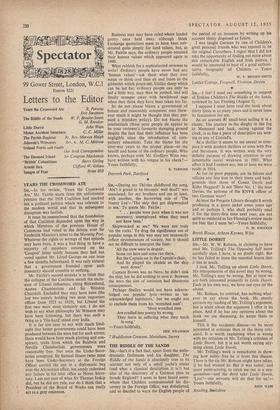SIR,—I feel I must say something in support of Erskine
Childers's The Riddle of the Sands, reviewed by Ian Fleming (August 5).
I suppose I must have read the book about thirty times in as many years and it never loses its fascination for me.
As an account f!if small-boat sailing it is a classic. The journey in the dinghy in the fog to Memmert and back, racing against the clock, is as fine a piece of descriptive sea writ- ing as any of Conrad's.
As a thriller it seems to me unreal to com- pare it with modern thrillers or even with Poe and Stevenson. It was written with the very definite purpose of drawing attention to our lamentable naval weakness in 1903. What effect it had I cannot say, but at least we were ready in 1914.
As for its poor puppets, are its heroes and villains any less true to their times and back- grounds than those of Conan Doyle and Rider Haggard? Is not 'Hero No. 1,' the man Davies, the epitome of the RNVR officer of two German wars?
At least the Penguin Library thought It worth producing in a green jacket some years ago and so perhaps I, who shall probably read it for the thirty-first time next year, am not quite so outdated as Ian Fleming's review made me fear that I must be !—Yours faithfully,


































 Previous page
Previous page